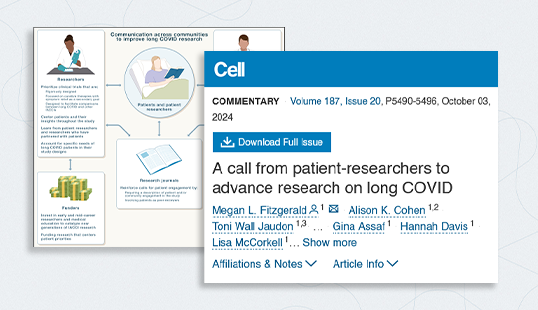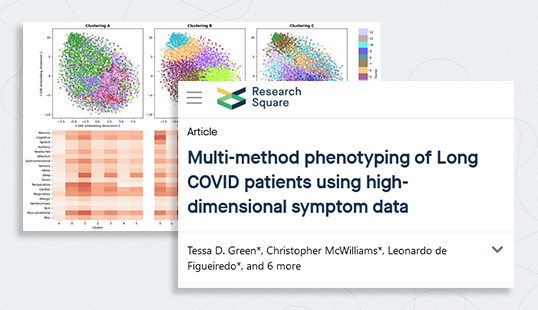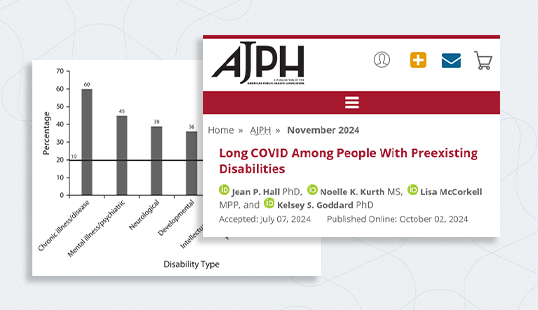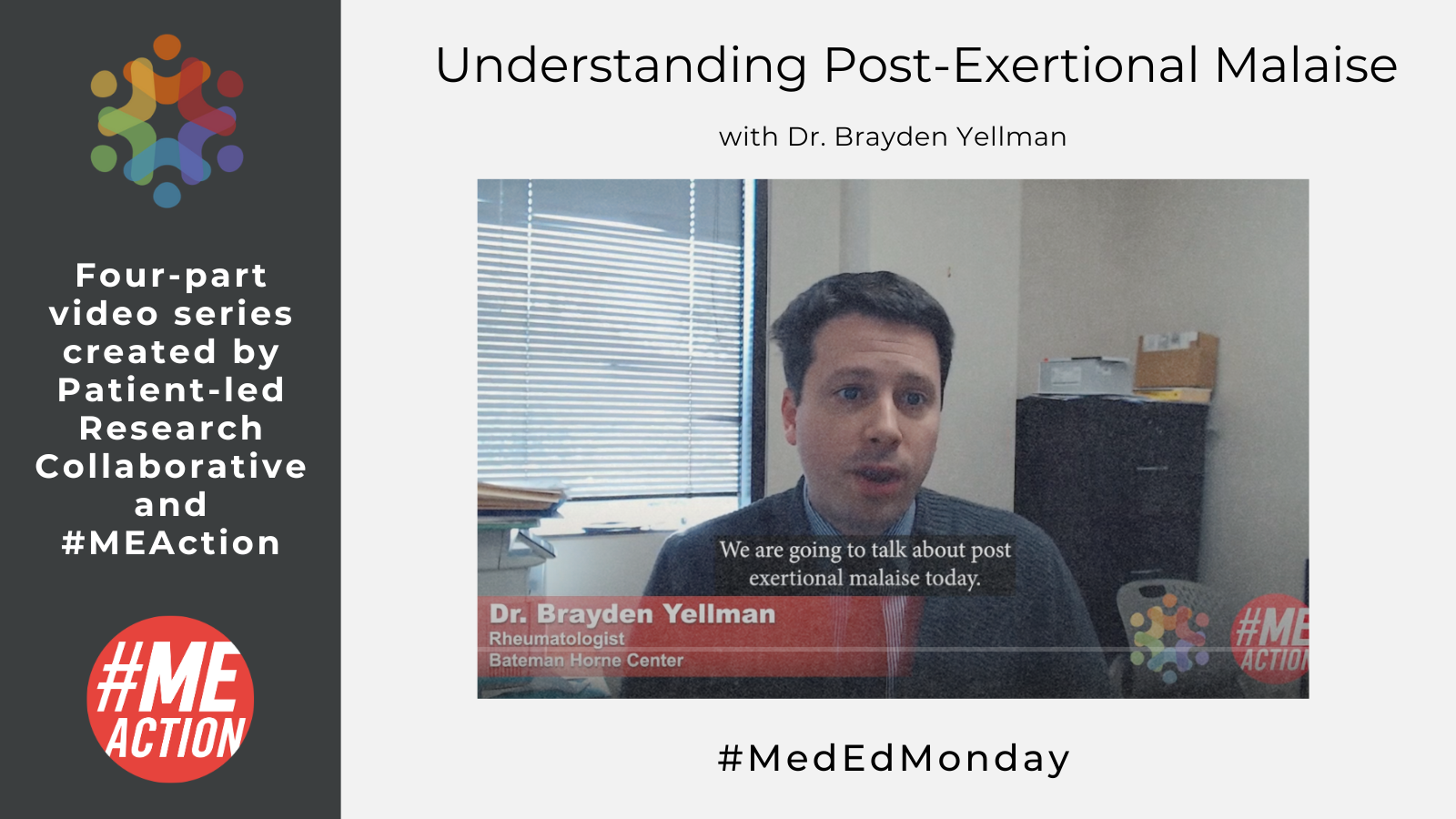
Hello! Welcome to Patient-Led Research Collaborative’s (PLRC) Quarterly Newsletter — this puHello! Welcome to Patient-Led Research Collaborative’s (PLRC) Quarterly Newsletter — this publication goes out four times a year to bring you the latest updates on PLRC’s work and critical updates on Long COVID and associated conditions.
This issue covers:
- New PLRC Paper on How to Advance Long COVID Research
- PLRC Preprint on Long COVID Phenotypes
- Moonshot Update: House Bill is Live!
- Long COVID Among People With Preexisting Disabilities
- Medical Education Series on PEM & Pacing
If you have been forwarded this email and would like to continue to hear from us:
New Publication in Cell: A Call From Patient Researchers to Advance Long COVID Research

Members of PLRC have authored a new publication in the journal Cell titledA call from patient-researchers to advance research on long COVID.This commentary addresses the disconnects that often exist between patients and researchers, and outlines how engaging patients as full collaborators is crucial to advancing progress towards Long COVID treatments and cures.
The paper proposes strategies for bridging existing gaps in communication between patients, researchers, clinicians, funders, journals, academic institutions, and professional organizations, which include:
- Involve patients as peer reviewers in research journals
- Prioritize clinical trials that are focused on curative therapies
- Invest in early and mid-career researchers and medical education to support new generations of infection-associated chronic condition (IACC) researchers
- Educate clinicians on how to diagnose and treat Long COVID
New Preprint: Multi-Method Phenotyping of Long COVID Patients

A new preprint from PLRC analyzed a dataset of 162 symptoms from 6,031 participants to explore making clusters of Long COVID patients using three machine learning methods. The dataset comes from responses of participants in PLRC’s COVID-19 Patient Experience Survey.
We found that consistent clusters aiming to group patients according to their symptoms were *not* discovered across the three methods. This implies:
- Symptoms may not be the best way to create phenotypes of Long COVID patients
- Studies that use fewer symptoms, fewer patients, or only use a single clustering methodology might be detecting phenotypes that cannot be replicated by other methods or studies
However, we found symptom burden consistencies across all methods:
High symptom burden clusters were associated with younger patients, women, and higher severity of physical and cognitive post-exertional malaise (PEM).
Representatives Ilhan Omar and Ayanna Pressley Introduce Long COVID Moonshot Bill in the House

We’re thrilled to share Representatives Ilhan Omar (D-MN) and Ayanna Pressley (D-MA) have introduced companion legislation to the Long COVID Research Moonshot Act in the House of Representatives. Senator Bernie Sanders (I-VT) introduced the bill in the Senate in August.
We now have live bills in both chambers of Congress! This legislation was inspired by the op-ed written last fall by PLRC co-founder Lisa McCorkell with Dr. Michael Peluso calling for a Moonshot for Long COVID – $1 billion/yr in funding for research for the next decade. PLRC has worked closely with Senator Sanders on this legislation to ensure many diverse voices in the community were heard and to have a bill that dedicates the amount of funding necessary to more adequately address Long COVID and recognize it for the public health crisis it is.
You can contact your representatives now about supporting the bill, using the Long Covid Moonshot Call Guide and Action Network Email. And stay tuned for more actions around this legislation!
Co-sponsors of the House Bill so far include:
Eleanor Holmes (D-DC), Bonnie Watson Coleman (D-NJ), Raul Grijalva (D-AZ), Rashida Tlaib (D-MI), Adam Smith (D-WA), Cori Bush (D-MO), Pramila Jayapal (D-WA), Barbara Lee (D-CA), James P. McGovern (D-MA), Jahana Hayes (D-CT), Nydia M. Velázquez (D-NY), Jamaal Bowman (D-NY), Delia C. Ramirez (D-IL), Gwen Moore (D-WI), Zoe Lofgren (D-CA), Kevin Mullin (D-CA), Maxwell Alejandro Frost (D-FL), Robert Garcia (D-CA), Janice Schakowsky (D-IL), Judy Chu (D-CA).
New Study: Long COVID Among People With Preexisting Disabilities

A new collaborative study that looks at rates of Long COVID among people with preexisting disabilities has been published in the American Journal of Public Health. Co-authored by University of Kansas Institute for Health and Disability Policy Studies’ Jean Hall, Noelle K. Kurth, and Kelsey S. Goddard and PLRC’s Lisa McCorkell.
Using data from the Household Pulse Survey and the National Survey on Health and Disability, the authors found that Long COVID prevalence was higher among people with preexisting disabilities than the general population (40.6% vs 18.9%). The authors conclude that people with preexisting disabilities experienced and continue to experience increased exposure to COVID-19 and barriers to accessing health care, COVID-19 vaccines, and COVID-19 tests. These barriers, combined with long-standing health disparities in this population, may have contributed to the greater prevalence of Long COVID among people with preexisting disabilities.
Key findings and recommendations include:
The needs of people with disabilities must be centered in the response to the COVID-19 pandemic and future pandemics to create equitable policies that improve health outcomes for this population.
Our recommendations include (but are not limited to):
Among people with preexisting conditions and disabilities, the prevalence of Long COVID was highest in those with chronic illness (diabetes, asthma) & lowest in those with sensory disabilities (deafness, blindness).
With the exception of sensory disabilities, all disability categories had higher Long COVID rates than the general population.
Public health authorities must better document the prevalence of Long COVID and possible contributing factors among people with preexisting disabilities so that adequate services and support are provided.
- Advance the understanding of the basic mechanisms of Long COVID pathogenesis, including enhancing knowledge of latent and the potential of persistently replicating COVID reservoirs.
- Develop and validate tools that allow for identification of viral persistence not only in the bloodstream but in tissue and other locations.
- Understand how chronic viral co-infections (e.g. EBV, CMV, HHV, Lyme) interact with the immuno-pathology of Long COVID and IACCs.
- Support clinical trials of immunomodulatory agents to treat Long COVID and myalgic encephalomyelitis.
#MEAction and PLRC Release Medical Education Series on PEM and Pacing

We are please to introduce a four-part series on post-exertional malaise and pacing created in partnership with #MEAction. Each video is an interview with an expert in the field conducted by Chimére L. Sweeney, a Long COVID patient advocate, author, speaker, filmmaker, and writer.
The video series includes:
- Understanding Post-Exertional Malaise (PEM) – Dr. Brayden Yellman of Bateman Horne Center of Excellence
- Implementing Pacing to Prevent PEM – Dr. Todd E. Davenport of the University of the Pacific
- PEM and Pacing in Mental Health – Brittany Spencer, LCPC of Space Between Counseling Services
- PEM and Pacing for the Pediatric Patient – Dr. Katherine Rowe of University of Melbourne Royal Children’s Hospital
We encourage you to share this series with your healthcare providers and network! You can also share the clinician pacing guide we created in partnership with #MEAction.
Read, Listen, Watch & More
- Read: New PLRC publication provides guidelines on designing and optimizing Long COVID clinical trials
- Listen: Visible App launches new podcast and first episode interviews PLRC co-founders, Lisa McCorkell and Hannah Davis
- Read: New PLRC preprint on impact of reinfections on Long COVID
- Watch: RECOVER-TLC 3-Day workshop videos now live, which includes several presentations from PLRC members
- Read: KQED, “Bay Area’s Long COVID Community Celebrates Moonshot Bill for $10 Billion in Funding”
- Register: PolyBio Fall Symposium on November 8
- Watch: Uniting Voices, Amplifying Impact: Collaborating to Support our IACC Communities — Webinar
- Share:Long COVID Essentials, new resource series of printable guides from Long COVID Justice and The Sick Times
- Webinar: Navigating Disability Justice — Addressing Long COVID & Health Inequities, November 7
- Watch: Ed Yong, “How the pandemic defeated me” XOXO Festival
- Listen: The Sick Times launches weekly podcast on latest COVID-19 numbers, Long COVID news, commentary and research.
- Survey: Help inform clinical trial research by sharing your Long COVID treatment experience with FDA CURE ID survey
Your donations support our work to conduct research and advocate for policies that enable patients to survive and thrive.
In solidarity,
Team PLRC
PS. Please reach out to team@patientledresearch.com to collaborate with our team or sponsor future Journals.
